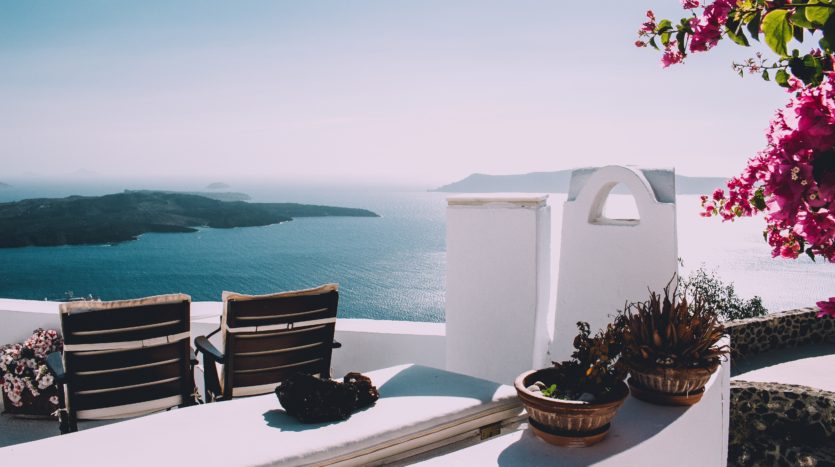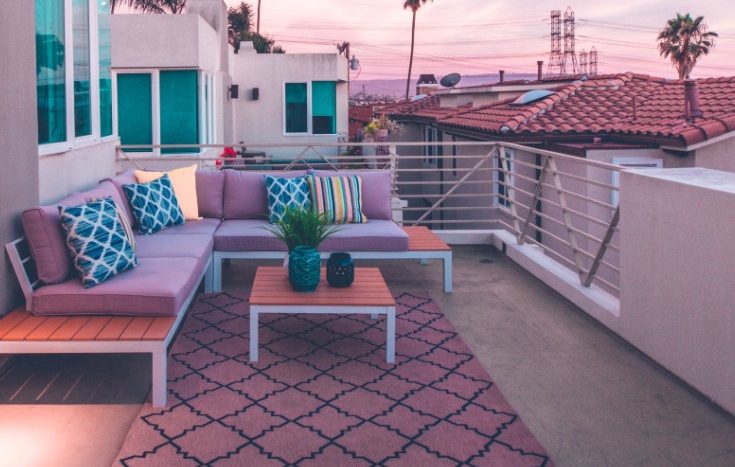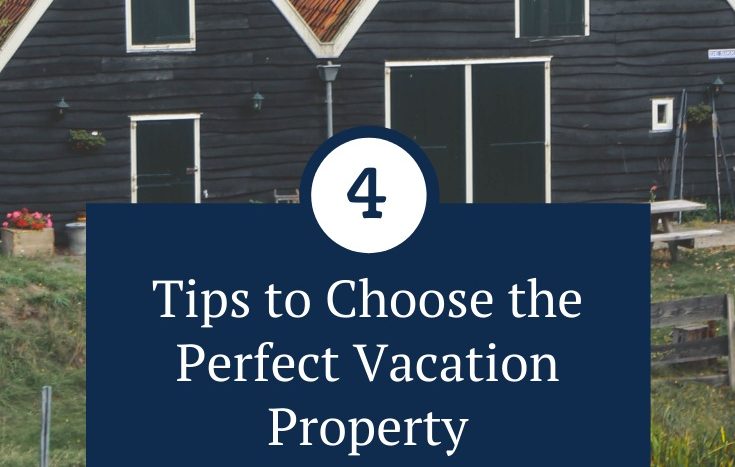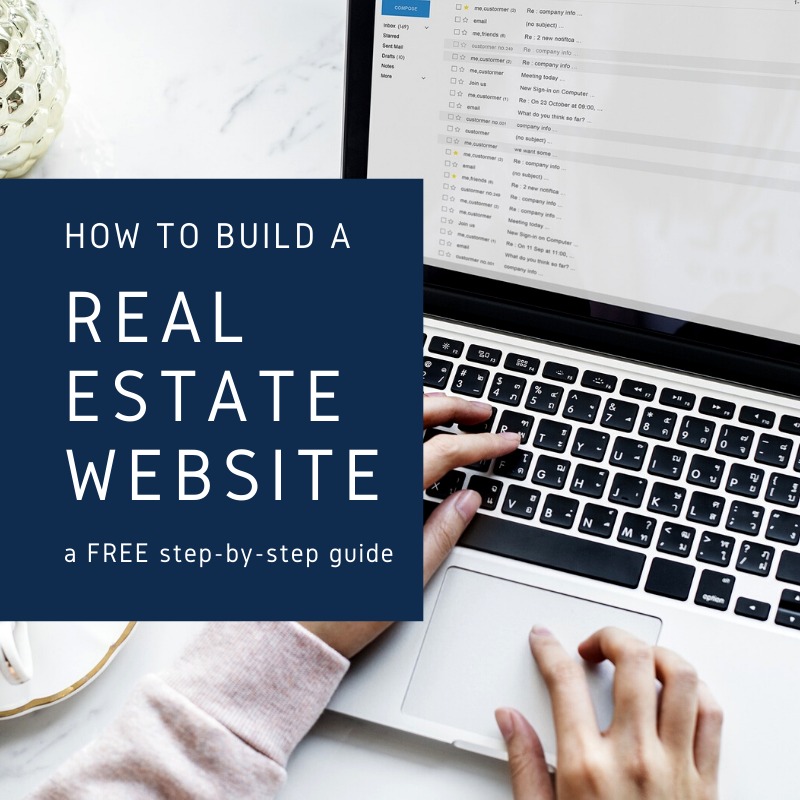We’ve gotten a few questions about vacation property investing since it was first featured on our 25+ Side Hustles for Realtors®. So today we’re doing a deeper dive on the topic.
Are you considering investing in vacation property? Something you could rent out on a short-to-medium term basis (somewhere between 2 nights and 3 months at a time)….something you might get to enjoy yourself from time-to-time.
https://recessionproofrealtor.com/wp-content/uploads/2018/11/Feature-44-Vacation-property.jpg
Have you stayed at an Airbnb and thought yeah, I could own a little place like this and make $100/night in rent.
That’s what this post is all about! Consider it your crash course on vacation property investing. We’ll help you:
- decide if investing in vacation property is the right move for you
- choose your vacation property
- finance your vacation property
- find renters for your vacation property
Before we jump in, we should note: This post isn’t about buying a timeshare or other fractional ownership interest. Timeshares aren’t investments. They aren’t likely to generate any cash flow for you or to increase in value enough to justify the initial “investment” plus all the fees. We’re talking about purchasing a property of your own, then renting it out to vacationers.
Is Vacation Property Investing for Me?
Is vacation property investing a good fit for you? Here’s a quick quiz to help you answer that question:
- Do you have 1) the time to manage frequent turnover, or 2) the money to hire a property manager to handle the frequent turnover?
- Can you afford the property, even if it sits vacant for stretches of time?
- Can you accept the fact that vacationers will be somewhat careless with your property?
If you answered yes to all of the above, you’re a great candidate to invest in a vacation property!
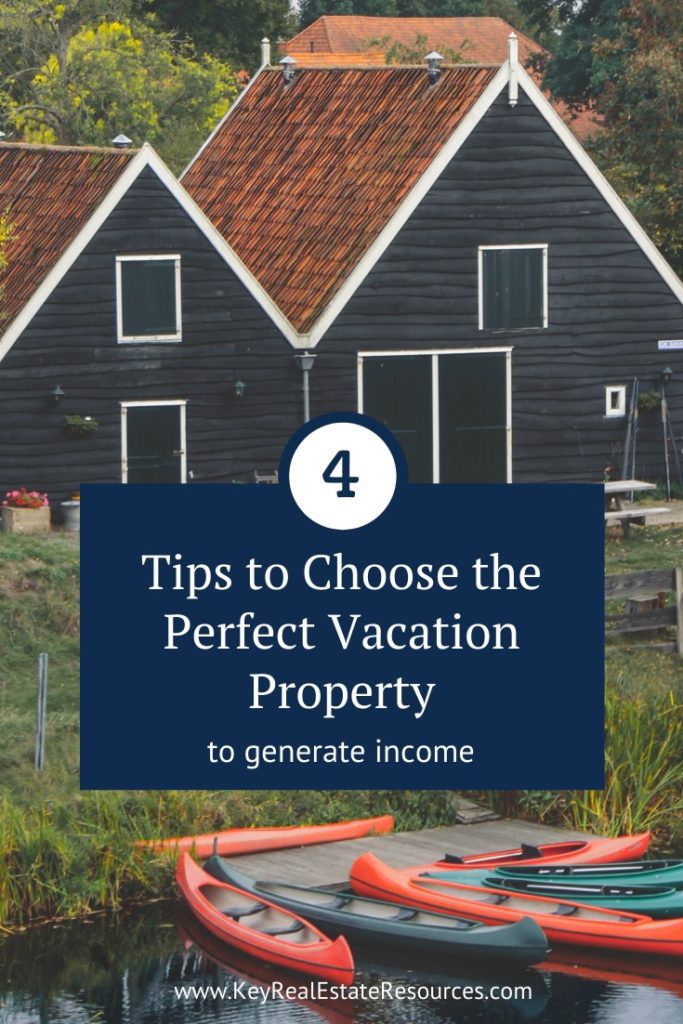
How to Choose Your Vacation Property
Of course there are a million factors that determine which property you end up purchasing. Let’s just talk about the 4 most important factors.
1. Location, location, location
We’re talking real estate, so location is naturally the single most important factor in choosing your new vacation property.
First, decide on a general geographic area, keeping your intended use for the property in mind. Do you want the property to be close enough to your primary residence so you can be a hands-on owner? Do you want the property located in a city near friends or family so you have a place to stay when you visit? Maybe you want a cabin on the slopes where you can host annual family vacations for decades to come! Or maybe you want a vacation property in the tropics that will ultimately serve as your home during retirement.
Keep your future renters in mind as well. The property needs to be in an area people want to visit. The more tourists/vacationers an area gets, the better!
Also consider what type of renters you’d like to attract. Properties in the heart of the city might rent to tourists for just a few nights at a time, but are probably needed year-round. Beach and lake properties probably rent for a week at a time, but only during certain times of the year. Properties in desert resort towns like Palm Springs or Lake Havasu may rent for 3-6 months during the winter, then sit vacant all summer.
The closer your vacation property is to the action, the more you can charge per night. For city properties, you want to be where the tourists go – walking distance to as many of the sites as possible. And being near a transit line is a huge competitive advantage.
For beach, lake, and ski properties, get as close to the sand, water, and slopes as you can.
Remember: If your vacation property isn’t located exactly where your renters want to be, they’ll go elsewhere, and you’ll end up with an empty money pit. So if you can’t afford a property in the ideal location, look at other markets. There’s no point in buying an inconveniently located vacation property.
And don’t forget little details like distance to a grocery store and a pharmacy/convenience store. This is especially important if you plan to convert the vacation property into your home at some point. Driving 15 miles on a winding mountain road to get groceries for a one-week vacation might not be a big deal, but if you lived there full time? That might get old fast.
2. Affordability
As you know, the mortgage isn’t the only expense to property ownership. You’ll have to consider:
- Taxes
- Insurance
- HOA fees
- Utilities
- Maintenance
- Cleaning services between renters
- Property management (if you don’t have the time or desire to do the work yourself)
- Furnishings, linens, dishes, etc
- Replacement costs of furnishing and linens when vacationers inevitably wear them down
- Toiletries
And you need to plan for vacancies and make sure the active rentals will more-than-cover the vacancy costs.
3. Matching the character to your ideal renters
Location and affordability will dictate the type of property you end up purchasing, which will heavily dictate the character and (to a large degree) the types of renters you will attract.
For example, if you purchase a beachfront condo in a Floridian retirement community, you’ll likely get older renters from further north, escaping the winter weather. Furnish and decorate the property to fit the part. What would be comfortable for those renters? And what would be a waste of money? Would those renters be impressed with your 65″ 4K TV and XBox?
On the other hand, if you’re hoping to rent to families taking the kids to Florida for a week on summer vacation, a family TV and game station could be a lifesaver on rainy days when everyone’s stuck inside.
So who do you want to attract? Families on vacation? Professionals on business? Millennials on a city break? Tailor the property to exceed the specific expectations of your target group.
4. Market Trends
Lastly, you want to buy in a solid market.
I can get a property on the river in my hometown in IL for under $50,000, but I wouldn’t because 1) anyone visiting that town is probably staying with their families, and 2) the population has been declining ever since the steel mill closed at the turn of the millennium. Property values aren’t increasing, but property taxes are. It’s just not a financially feasible market.
When checking markets, look at value growth to make sure your new property will be a good long-term investment.
And check tourist statistics. Are people visiting the area? How long are they staying? How much are they paying?
Make sure you understand the market well before making any offers.
How to Finance Your Vacation Property
Unless you have enough cash to cover your purchase, closing costs, any renovations, and furnishings, you’re going to need to take on a mortgage to finance your new vacation property.
While this isn’t really the place to address the different mortgage types available to you, we do want to address the broad points of vacation property financing.
Remember, it is more difficult to qualify for a mortgage on an investment property than it is to qualify for a mortgage on your primary residence. Lenders know you’ll do everything you can to save your own home from foreclosure, but when times get tough, you may be willing to default on your investment property mortgages. So lenders typically require higher down payments, better credit, and strict proof of income for investment properties.
Are you financially ready to purchase a vacation property? Being financially ready means:
- You make enough money to qualify for a mortgage loan (and it can all be proven through pay stubs, bank statements, etc).
- You’ve got good-to-great credit (typically at least a 720).
- You have enough liquid savings to cover all the upfront costs plus enough to pay the mortgage while you wait for your first renters.
- You’re financially stable. Your income and credit are steady and secure.
When you think you might be ready, contact a couple lenders to compare rates and get pre-qualified for a mortgage. That way, when you find the perfect property, you can make an offer, confident in your ability to secure financing.
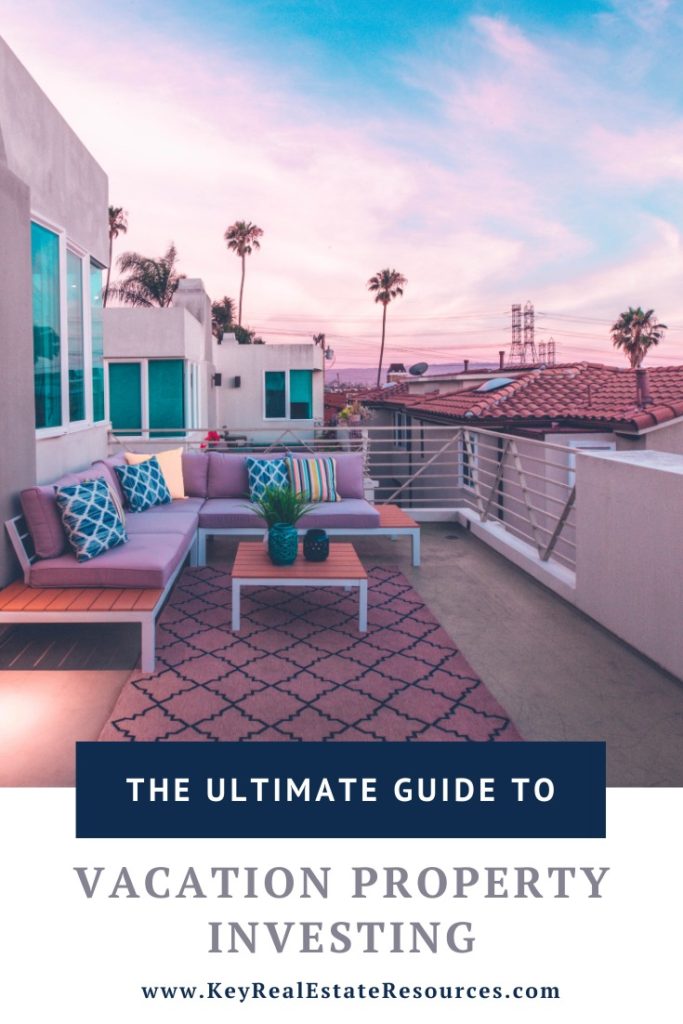
How to Find Renters for Your Vacation Property
Airbnb is probably the quickest and easiest way to market your vacation property yourself. Airbnb’s platform will help renters find your property, check available dates, book a reservation, communicate with you if they have any questions, and even pay for the rental. Renters are already on Airbnb looking for a place to stay, so you might as well go where the renters already are!
Airbnb also doesn’t charge much for these services. It’s just a 3% fee from your rentals for providing the platform.
You probably wouldn’t be able to find renters for less than 3% anyway. To find renters, you’d need to advertise somewhere. If not on Airbnb, then through Facebook ads or something similar. And today’s renters expect the ease of using a platform like Airbnb to make reservations and payments. It’s not like they’re going to call you on the phone to reserve your vacation property, then write you a check as payment.
On the other end of the spectrum, you could pay a property management company to take care of everything for you. They’ll take care of the marketing, reservations, any complaints, collections, and cleaning/restocking between renters. Of course this service, which allows you to be completely passive, costs a lot more than 3%. Expect to spend more like 15-30% for full property management services for your vacation property.
Learn More About Vacation Property Investing
The Modest Wallet’s Step-by-Step Guide to Real Estate Investing offers a great overview of different ways you can invest in real estate, as well as some key tips to help you get started.
Of course buying a property is a big investment. You certainly don’t want to jump in after just reading a few blog posts. Amazon has some great books available on the topic to help you learn all the ins and outs before you make this important decision. Check out a few of the best.
Happy investing!

